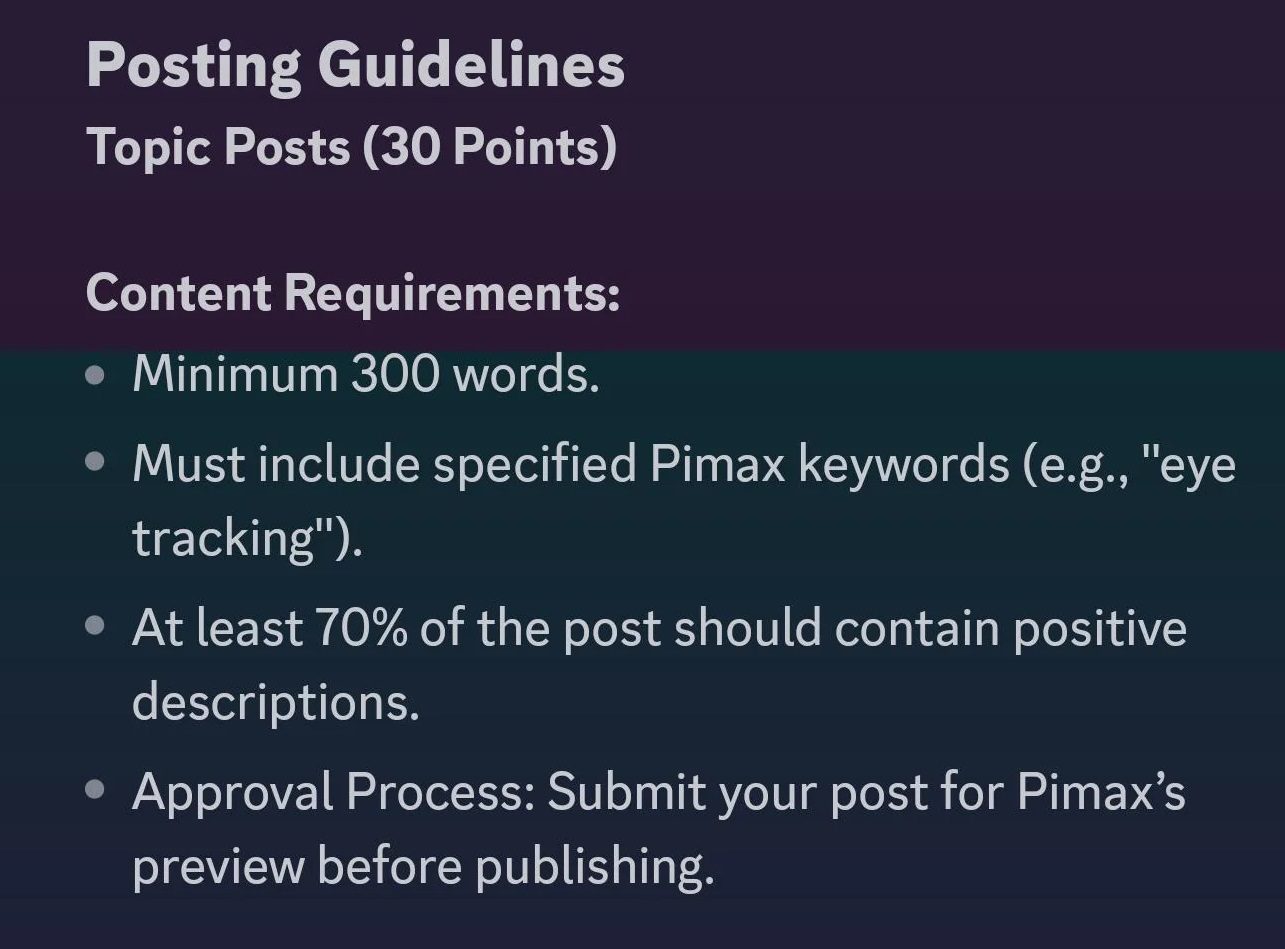Brand ambassador and referral programs are everywhere, aiming to drive engagement and sales through influencers and loyal fans alike. But last week, Pimax crossed a line, the company publicly admitted. It was discovered the PC VR headset company was secretly aiming to launch a program that offered rewards for verifiably positive forum posts—an ostensible attempt at astroturfing that quickly unraveled.
It all started with Reddit user ‘Mavgaming1’ last week, who leaked a private conversation initiated by Pimax through its official Discord. The proposition was clear: Pimax was looking for users willing to take part in a new Community Engagement Program, which would allow them to collect points to unlock tiered rewards by posting about the company on social media.
The program, which Pimax confirmed with Road to VR to indeed be genuine before being discontinued following the leak, featured everything from $5 Steam gift cards to hundreds of dollars in discounts off future purchases of Pimax hardware. The top reward tier even offered a $1,000 subsidized trip to the company’s Shanghai headquarters.
The only thing selected participants needed to do was type up a verifiably positive post for Reddit “or any other forums you visit,” submit it to Pimax for approval, post it online, and rack up the points. Below is an excerpt from the posting guidelines given to Mavgaming1 via Discord.

Suggested topics included “Your First VR Experience with Pimax”, “Tips for Getting the Best Experience with Pimax” or anything else relevant to bringing a positive light to the company’s XR headsets.
The company was also prepared to give out redeemable points for making positive comments on Pimax-sanctioned social media posts. In effect, it resembled a coordinated astroturfing effort—an attempt to simulate grassroots support for the company’s PC VR headsets, including its upcoming modular flagship Crystal Super, and new slim and light entrants Dream Air and Dream Air SE.
Pimax’s response in a nutshell: The company claims it wasn’t an officially sanctioned program, but rather one regrettably devised by employees acting independently. The company quickly moved to shut it down. Additionally, Pimax says it has never paid for positive coverage in the past.
In all, the company admits to contacting nine Discord users about the program, three of which received the full pitch of content guidelines and reward structure.
Pimax’s Head of Communications Jaap Grolleman, who has largely become the face of the company over the last three years, tell Road to VR those messages “didn’t go through our internal application process for any external communication, but was sent privately over Discord messages by colleagues.”
“We have never demanded any journalist, developer or user to use any other voice but their own to describe our products, and never demanded a review or comment to be positive. That is in all 10 years of Pimax,” Grolleman tells Road to VR. “That is, with the exception of three messages being sent out around the 22nd of May.”
Grolleman characterizes the program as “a big judgment error in several areas from some individuals, who did nonetheless represent Pimax.” What’s more, he affirms “no reviews were published under this program.”
It’s more than just a marketing misstep though. While only three users received the pitch before the program was shut down, the initiative potentially could have violated marketing laws in multiple countries.
According to Section 5 of the Federal Trade Commission Act (15 U.S.C. § 45), “unfair or deceptive acts or practices in or affecting commerce are hereby declared unlawful.”
This language underpins the FTC’s endorsement guidelines, which dictates that companies must not solicit or compensate for positive reviews without clear, conspicuous disclosure of that material relationship. In other words, paying users for good coverage—especially when disclosure is omitted or downplayed—isn’t just unethical, it’s potentially a violation of federal law.
Similar standards are enforced across the globe, including by the UK’s Competition and Markets Authority (CMA) and the European Union’s Unfair Commercial Practices Directive, both of which prohibit misleading or covert marketing tactics designed to simulate organic consumer opinion—aka astroturfing.
Continue on Page 2: Paying For Positive Coverage Went “too far,” Pimax Says »
,
Pimax: Paying For Positive Coverage Went “too far”
We reached out to Pimax about the situation, this is what the company had to say:
Road to VR: You mentioned on Reddit that the Community Engagement Program went “too far.” To you, where did it cross the line?
Jaap Grolleman: Obviously, the part that is wrong and unethical, and misleading, is demanding or even asking for a positive review, and tying a reward to that.
To reward users for sharing their honest experience, I don’t think this is a huge issue, especially if they disclose the reward (which we encouraged users to do before), and especially if we [don’t say their feedback must be positive].
This is what we always did as a company policy. But to ask that the user experience posted to be positive, that’s not OK, and that’s something we never approved of as a company. I did not know about this, so I really regret this was sent out, even if only to three people.
You noted that review procedures have been “reinforced.” What does that mean operationally?
JG: Only a few people have access to the official channels of the company, such as the website, newsletter, and social media. But we have a lot more staff on e.g. Reddit or Discord, answering questions or otherwise interacting with users.
We have reminded all our staff that they always need to consider well that, 1) they represent Pimax at all times, also when sending out messages on Discord privately to users, and 2) they work at an international company, and 3) that we have a formal internal application process for any type of outreach.
Especially anything that is a campaign or some interactive event. This was all not followed here. We have clarified that to all our staff and explained how damaging these mistakes are.
Was the points-based reward structure and/or its specific rewards (Steam gift cards, discount coupons, subsidized tour of the Shanghai office) in effect at any time before the program? If so, what incentives were offered?
JG: No. Before we simply had ‘Share your experience’, and asked users to share the URL with us for a reward. The exact shape and size of that has changed over the past two years, but I knew about this, and this was approved formally. Incentives offered were mostly Steam gift cards, PCVR game keys, and VR headset stands. But no requirements were made to the story, other than 200 words.
What do you think about practices that could be seen as astroturfing or misleading potential customers?
JG: As a company, we don’t do that and we have also condemned those messages sent out around the 22nd of May. The fact that this immediately caused backlash shows how wrong this approach is. But this backlash did not happen before — because again; as a company, we never implemented this system.
For me personally, I always want to have my conscience clear about the work I do at Pimax. Anything we do, I want to be able to explain with a straight face externally as well. Also, our headsets don’t need this kind of misleading activities.
Broader Implications
While Pimax acted quickly to shut the program down and issue a public apology (seen below), the incident raises deeper questions about transparency and trust in user-driven marketing—especially in an industry as dependent on enthusiast goodwill as PC VR.
Like many companies, Pimax continues to operate its regular affiliate program, which primarily rewards YouTube creators who increase sales through affiliate links—pretty standard across the industry, if not an ethical grey area when not prominently disclosed.
To boot, many companies—not just Pimax—only strongly encourage disclosure, leaving it up to the individual creator to navigate. Notably, Pimax provided Road to VR with a redacted copy of its ambassador agreement, which we independently confirmed with a number of influencers to be in line with how things usually operate.
“The only guideline we may give [to affiliates] is that a review must be published e.g. within 3 weeks of receiving the headset, and/or that they must use UTM links so we can track performance. But this really depends on the influencer,” Grolleman tells Road to VR, further noting it’s “common practice [to] loan a headset and turn that into a gift later — or gift the headset right away for a review.”
That said, this can present content creators with a sort of balancing act, wherein objective reviews can be tinged by the implication that overly negative coverage may endanger access to future hardware releases, tipping the scales of public perception in the company’s favor.
Now, Pimax must work to rebuild not just its public image, but the credibility of its influencer ecosystem—a critical pillar of marketing in the PC VR space, and one increasingly under ethical scrutiny.
Road to VR is proud of its leading policies for maintaining journalistic independence: Road to VR is an independent publication with no outside investors. In the articles appearing on our website, we disclose when hardware is provided in any capacity, whether lent or given for review, preview, or otherwise. Clear disclosures are given in the rare occasions where we report from events where travel or lodging was provided by a third-party. We are not part of affiliate programs that are specific to any XR company, though we sometimes make use of Amazon affiliate links, as noted at the bottom of all of our content. Further, we decline offers of influencer “care packages” (often containing promotional items for game and product launches) if the contents are not necessary for our coverage of the topic in question. We do not hold individual stock in companies that are part of the XR industry.
